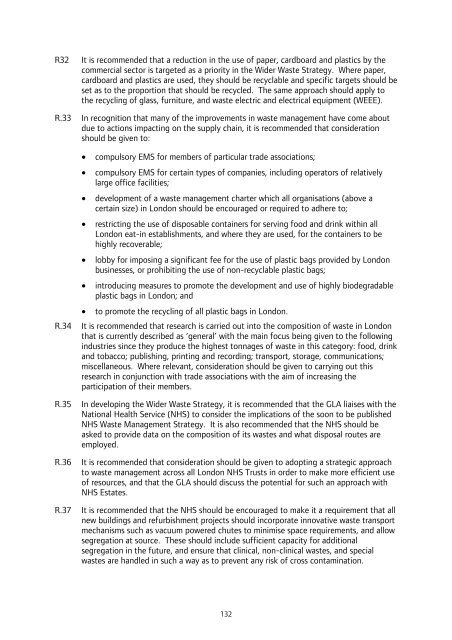London Wider Waste Strategy - London - Greater London Authority
London Wider Waste Strategy - London - Greater London Authority
London Wider Waste Strategy - London - Greater London Authority
You also want an ePaper? Increase the reach of your titles
YUMPU automatically turns print PDFs into web optimized ePapers that Google loves.
R32 It is recommended that a reduction in the use of paper, cardboard and plastics by the<br />
commercial sector is targeted as a priority in the <strong>Wider</strong> <strong>Waste</strong> <strong>Strategy</strong>. Where paper,<br />
cardboard and plastics are used, they should be recyclable and specific targets should be<br />
set as to the proportion that should be recycled. The same approach should apply to<br />
the recycling of glass, furniture, and waste electric and electrical equipment (WEEE).<br />
R.33 In recognition that many of the improvements in waste management have come about<br />
due to actions impacting on the supply chain, it is recommended that consideration<br />
should be given to:<br />
• compulsory EMS for members of particular trade associations;<br />
• compulsory EMS for certain types of companies, including operators of relatively<br />
large office facilities;<br />
• development of a waste management charter which all organisations (above a<br />
certain size) in <strong>London</strong> should be encouraged or required to adhere to;<br />
• restricting the use of disposable containers for serving food and drink within all<br />
<strong>London</strong> eat-in establishments, and where they are used, for the containers to be<br />
highly recoverable;<br />
• lobby for imposing a significant fee for the use of plastic bags provided by <strong>London</strong><br />
businesses, or prohibiting the use of non-recyclable plastic bags;<br />
• introducing measures to promote the development and use of highly biodegradable<br />
plastic bags in <strong>London</strong>; and<br />
• to promote the recycling of all plastic bags in <strong>London</strong>.<br />
R.34 It is recommended that research is carried out into the composition of waste in <strong>London</strong><br />
that is currently described as ‘general’ with the main focus being given to the following<br />
industries since they produce the highest tonnages of waste in this category: food, drink<br />
and tobacco; publishing, printing and recording; transport, storage, communications;<br />
miscellaneous. Where relevant, consideration should be given to carrying out this<br />
research in conjunction with trade associations with the aim of increasing the<br />
participation of their members.<br />
R.35 In developing the <strong>Wider</strong> <strong>Waste</strong> <strong>Strategy</strong>, it is recommended that the GLA liaises with the<br />
National Health Service (NHS) to consider the implications of the soon to be published<br />
NHS <strong>Waste</strong> Management <strong>Strategy</strong>. It is also recommended that the NHS should be<br />
asked to provide data on the composition of its wastes and what disposal routes are<br />
employed.<br />
R.36 It is recommended that consideration should be given to adopting a strategic approach<br />
to waste management across all <strong>London</strong> NHS Trusts in order to make more efficient use<br />
of resources, and that the GLA should discuss the potential for such an approach with<br />
NHS Estates.<br />
R.37 It is recommended that the NHS should be encouraged to make it a requirement that all<br />
new buildings and refurbishment projects should incorporate innovative waste transport<br />
mechanisms such as vacuum powered chutes to minimise space requirements, and allow<br />
segregation at source. These should include sufficient capacity for additional<br />
segregation in the future, and ensure that clinical, non-clinical wastes, and special<br />
wastes are handled in such a way as to prevent any risk of cross contamination.<br />
132
















